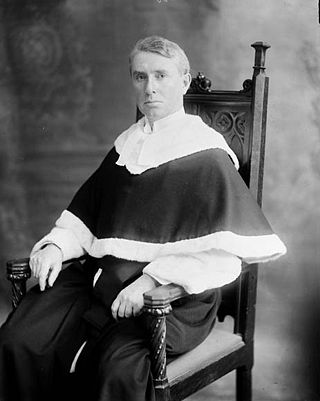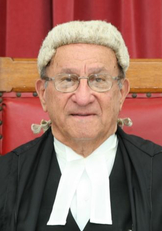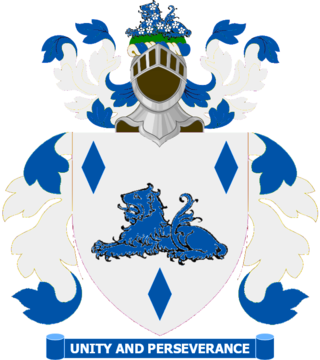Sir Hartman Godfrey Longley (born February 24, 1952, in Nassau, Bahamas) is the former Chief Justice of The Commonwealth of The Bahamas having been sworn on February 2, 2015. [1]
Sir Hartman Godfrey Longley (born February 24, 1952, in Nassau, Bahamas) is the former Chief Justice of The Commonwealth of The Bahamas having been sworn on February 2, 2015. [1]
Longley received his early education at the Government High School, Nassau, Bahamas, graduating in 1966.[ citation needed ]
Sir Hartman was called to the Bahamas Bar on October 6, 1976. He served as assistant counsel in the Attorney General's chambers from 1976 and 1978. He also served as a magistrate in Nassau and Freeport, from September 1993 to July 1995 and held the position of chief magistrate. He was appointed to the Supreme Court in July, 1995, he served until 2005, when he was appointed to the Court of Appeal, and returned to the Supreme Court in 2010.[ citation needed ]
He has served as Justice of the Supreme Court, Justice of the Court of Appeal, Senior Justice and, in February, succeeded Sir Michael Barnett as Chief Justice, the nation's highest judicial office. Sir Hartman has been appointed a Knight Bachelor in recognition of his contributions to the legal and judicial system of The Bahamas. [2]
Sir Hartman is married to the former Sonya L. Smith and is the father of two sons, one daughter and the grandfather of four.[ citation needed ]

Sir Lyman Poore Duff,, PC(UK) was a Canadian lawyer and judge who served as the eighth Chief Justice of Canada. He was the longest-serving justice of the Supreme Court of Canada.

Lesbian, gay, bisexual and transgender (LGBT) people in the Bahamas have limited legal protections. While same-sex sexual activity is legal in the Bahamas, there are no laws that address discrimination or harassment on the account of sexual orientation or gender identity, nor does it recognize same sex unions in any form, whether it be marriage or partnerships. Households headed by same-sex couples are also not eligible for any of the same rights given to opposite-sex married couples.
Vincent Lee McKusick was an American attorney and Chief Justice of Maine. At the time of his death McKusick worked at the firm Pierce Atwood in Portland, Maine, as of Counsel.

The judicial officers of the Republic of Singapore work in the Supreme Court and the State Courts to hear and determine disputes between litigants in civil cases and, in criminal matters, to determine the liability of accused persons and their sentences if they are convicted.

Sir Edward Zacca was chief justice of the Jamaican Supreme Court from 1985 to 1996. Under the Constitution of Jamaica, the chief justice of Jamaica serves as acting governor-general of Jamaica when that office is vacant, and Chief Justice Zacca served in that capacity from March to August 1991. Zacca was succeeded as Chief Justice by the Hon. Mr. Justice Lensley Wolfe.
Sir Leonard Joseph Knowles, CBE was the first Chief Justice of the Bahamas of an independent Bahamas.

Sir Alan Armstrong Huggins was a British colonial judge serving in places including Uganda, Hong Kong and Brunei. He spent nearly 40 years in the judiciary of Hong Kong, serving as a Vice-President of the Court of Appeal from 1980 to 1987. After the transfer of sovereignty over Hong Kong in 1997, he was appointed a non-permanent Hong Kong judge of the Court of Final Appeal until 2003.

Sir Burton Percival Curtis Hall, KCHS is a Judge of the UN International Residual Mechanism for Criminal Tribunals.

The Supreme Court of the Bahamas is the third highest court in the adjudicative hierarchy of the Commonwealth of the Bahamas. The court was created by Article 93(1) of the Constitution. Before that, the Supreme Court was governed by the Supreme Court Act of 1896.

The Supreme Court of Sierra Leone is the highest court in Sierra Leone. It has final jurisdiction in all civil, criminal, and constitutional cases within Sierra Leone, and its decisions cannot be appealed. The Supreme Court has the exclusive constitutional power to overturn ruling of lower courts within the jurisdiction of Sierra Leone. The Supreme Court, along with the Court of Appeals, High Court of Justice, and magistrate courts form the Judicial branch of the Government of Sierra Leone.

The basis of the Bahamian Law and legal system lies within the English Common Law tradition. Justices of the Supreme Court, Registrars and Magistrates are all appointed by The Governor-General acting on the advice of the Judicial and Legal Service Commission, which is composed of five individuals who are headed by the Chief Justice as their chairman. The Chief Justice and the Justices of the Court of Appeal, including the President, are appointed by the Governor-General on the recommendation of the Prime Minister after consultation with the Leader of the Opposition. Once appointed, the salaries and other terms of appointment of the Chief Justice, Justices of Appeal and Justices of the Supreme Court cannot be altered to their disadvantage. Justices of the Supreme Court can serve until the age of 65 years and, where agreed among the judge, the Prime Minister and the Leader of the Opposition, may serve until the age of 67. Justices of Appeal can serve until the age of 68 years and, where agreed among the judge, the Prime Minister and the Leader of the Opposition, may serve until the age of 70 years. The law of The Bahamas makes provisions for the appointment of 12 Justices to the Bench of the Supreme Court, inclusive of the Chief Justice, and for five Justices of the Court of Appeal, inclusive of the President. The Chief Justice, as Head of the Judiciary, is an ex officio member of the Court of Appeal, but only sits at the invitation of the President.
The chief justice of the Bahamas heads the Supreme Court of the Bahamas.
Sir Cyril Stanley Smith Fountain is a Bahamian judge and lawyer.

The Judiciary of Kenya is the system of courts that interprets and applies the law in Kenya. After the promulgation of the Constitution of Kenya in 2010, the general public, through parliament, sought to reform the judiciary. Parliament passed the Magistrates and Judges Vetting Act of 2011. A major part of reforming the judiciary was the vetting of Magistrates and Judges in an attempt to weed out unsuitable ones. The Judicature Act has also been amended to raise the minimum number of Magistrates and Judges allowing more judicial officers to be hired. More magistrates and judges are needed to clear the backlog of cases that have caused great delay in the conclusion of cases and to staff new courts. New courts are needed to bring the courts closer to the people which is in line with devolution, a major principle written into the Constitution of 2010. New courts like the High Court opened in Garissa in November 2014 is a good example. In the past residents of North Eastern Kenya had to go all the way to Embu to access a High Court.

The judiciary of Solomon Islands is a branch of the Government of Solomon Islands that interprets and applies the laws of Solomon Islands, to ensure equal justice under law, and to provide a mechanism for dispute resolution. The legal system is derived from chapter VII, part II of the Constitution, adopted when the country became independent from the United Kingdom in 1978. The Constitution provided for the creation of a High Court, with original jurisdiction in civil and criminal cases, and a Court of Appeal. It also provided for the possibility of "subordinate courts", with no further specification (art.84).
Anthony Benin is a Ghanaian judge and is a former justice of the Supreme Court of Ghana. He was one of two judges sworn into office by the President of Ghana, John Dramani Mahama in the presence of the Chief Justice of Ghana, Georgina Theodora Wood in November 2012.
Sir Bruce Lockhart Burnside was a Bahamian lawyer and politician.
Timothy Francis Carmody is an Australian judge who was the Chief Justice of Queensland between 8 July 2014 and 1 July 2015. His previous roles include work as a police officer, barrister, Queensland Crime Commissioner, Family Court of Australia judge, and Chief Magistrate of the Magistrates Court of Queensland. He also presided over the 2013 Child Protection Commission of Inquiry.
Kankanithanthri T. Chitrasiri is a puisne justice of the Supreme Court of Sri Lanka who was appointed by President Maithripala Sirisena in 2016 to replace Justice Rohini Marasinghe. He was justice of the Court of Appeal of Sri Lanka, judge of the High Court and a magistrate.

Sir Cornelius Alvin Smith is a Bahamian politician and diplomat, who served as the 11th Governor-General of the Bahamas from 2019 to 2023.